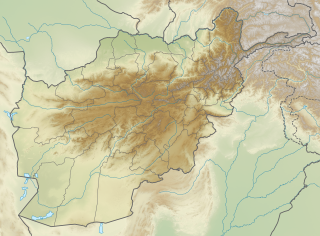 W
WThe 2005 Hindu Kush earthquake hit northeastern Afghanistan with a magnitude of 6.5 on December 12 at 21:47 (UTC). According to the United States Geological Survey's ShakeMap and Did You Feel It? products, the maximum Mercalli intensity was VI (Strong) at Chitral. Five people were killed in the Hindu Kush region and landslides blocked several roads near Bagh, Kashmir. The earthquake occurred some 65 miles away from Faizabad, a city in the Hindu Kush mountains, but it could be felt in many neighboring areas. It could even be felt about 200 miles away in Islamabad, Pakistan. The quake was strong enough to trigger panic among survivors of October's devastating earthquake, who came out from their makeshift shelters in freezing temperatures. Although magnitude-6 earthquakes typically cause severe damage, this quake caused relatively little due to the fact that it occurred deep underground.
 W
WKam Air Flight 904 was a scheduled passenger domestic flight, flying from Herat Airfield in Herat to Kabul International Airport in Afghanistan's capital of Kabul. On February 3, 2005, the aircraft impacted mountainous terrain, killing all 96 passengers and 8 crew on board.
 W
WParliamentary elections were held in Afghanistan alongside provincial elections on 18 September 2005. Former warlords and their followers gained the majority of seats in both the lower house and the provincial council. Women won 28% of the seats in the lower house, six more than the 25% guaranteed in the 2004 constitution.
 W
WOperation Tar Heels was a military operation launched by US Marines in Laghman Province, eastern Afghanistan. Patrols of around 30 men were ambushed in several places, but the Taliban attackers were driven back. The Marines lost team leader Nicholas Kirven in the meantime. Otherwise, the operation to patrol Laghman Province was a success.
 W
WUnited Nations Security Council resolution 1589, adopted unanimously on 24 March 2005, after reaffirming all resolutions on the situation in Afghanistan, particularly Resolution 1536 (2004), the Council extended the mandate of the United Nations Assistance Mission in Afghanistan (UNAMA) for an additional period of twelve months until 24 March 2006.
 W
WUnited Nations Security Council resolution 1623, adopted unanimously on 13 September 2005, after reaffirming all resolutions on the situation in Afghanistan, particularly resolutions 1386 (2001), 1413 (2002), 1444 (2002), 1510 (2003) and 1563 (2004), and resolutions 1368 (2001) and 1373 (2001) on terrorism, the Council extended the authorisation of the International Security Assistance Force (ISAF) until mid-October 2006.
 W
WThe war on terror, also known as the Global War on Terrorism and U.S. War on Terror, is an international military campaign launched by the United States government after the September 11 attacks. The targets of the campaign are primarily Sunni Islamic fundamentalist armed groups located throughout the Muslim world, with the most prominent groups being Al-Qaeda, the Islamic State, the Taliban, Tehrik-i-Taliban Pakistan, and the various franchise groups of the former two organizations. The naming of the campaign uses a metaphor of war to refer to a variety of actions that do not constitute a specific war as traditionally defined. U.S. president George W. Bush first used the term "war on terrorism" on 16 September 2001, and then "war on terror" a few days later in a formal speech to Congress. In the latter speech, George Bush stated, "Our enemy is a radical network of terrorists and every government that supports them." The term was originally used with a particular focus on countries associated with al-Qaeda. The term was immediately criticised by such people as Richard B. Myers, chairman of the Joint Chiefs of Staff, and more nuanced terms subsequently came to be used by the Bush administration to publicly define the international campaign led by the U.S. While it was never used as a formal designation of U.S. operations in internal government documentation, a Global War on Terrorism Service Medal was issued.